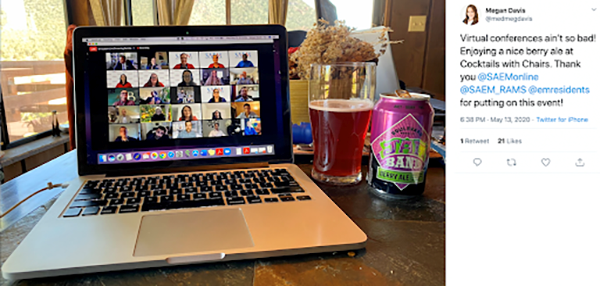While the COVID-19 pandemic continued to affect each corner of the world, emergency medicine physicians were leading on the front line while also meeting together to imagine the future of our specialty.
EMRA and SAEM RAMS collaborated alongside EM department chairs across the nation as part of the May Virtual SAEM Meeting. Our "Cocktails with Chairs" event sought to reduce the power distance between residents and EM department chairs and afforded an intimate session with residents, attending physicians, and medical students - over cocktails!
Our Chairs
- Andra Blomkalns is the founding Chair of the Department of Emergency Medicine at Stanford School of Medicine.
- Michael Brown is the founding Chair of the Department of Emergency Medicine at the Michigan State University College of Human Medicine and Immediate Past President of the Association of Academic Chairs of Emergency Medicine.
- Bo Burns is the George Kaiser Family Foundation Chair of the Department of Emergency Medicine at the University of Oklahoma School of Community Medicine and current CORD Board Member.
- Gabe Kelen is the founding Chair of the Department of Emergency Medicine at Johns Hopkins University and current ACEP Board Member.
- Ian Martin is the Chair of the Department of Emergency Medicine at the Medical College of Wisconsin and Immediate Past President of SAEM.
- Angela Mills is the founding Chair of the Department of Emergency Medicine at Columbia University Vagelos College of Physicians and Surgeons, the Chief of Emergency Services of New York - Presbyterian - Columbia, current SAEM Board Member, and 2019 EMRA Inaugural EM Chair of the Year.
Our chairs gave insight into their experience, day-to-day roles, and career trajectory from resident physician to leader of their respective departments and our field. Here are 10 pearls gleaned from the event that you can use in your journey of becoming an emergency physician.
Secret Sauce: Failure is necessary
Remember that not every idea, project, or initiative will be successful. Something may seem better in theory than it turns out in practice. Part of leadership is learning from these experiences, taking setbacks in stride, and moving forward.
Imposter Syndrome
Many students and residents face imposter syndrome - EM department chairs are no exception. Many of the chairs noted feeling inadequate compared to their colleagues during their residency training. They reported imposter syndrome as a driving factor in working hard to develop their clinical knowledge base.
"Planting Trees Under Whose Shade You May Never Sit"
Being a chair is like being a maestro. One of the key tenets of being a chair includes advocating for your department, junior learners, and the field of emergency medicine. Some of our panelists were founding department chairs. The success of your colleagues is a reflection of your success. Part of the goal of a chair is building up the next generation of leaders in our field.
High Reliability Culture
Our chairs described the importance of establishing a highly reliable culture of continuous improvement, trust, and consistency. This triad helps accelerate the process of building trust and can help you starting day one of residency.
The Power of Radical Candor
Honest, professional, and direct conversations build relationships that hold people accountable. Be candid, but with compassion, as you lead your department and in your residency.
Portfolio of Skills
Cultivate skills that will make you an effective leader including listening, understanding and being approachable. Be intellectually flexible. Be a learner and take advantage of various developmental and national opportunities within EMRA and SAEM.
Go First
Raise your hand to help in the time of need. Often leadership roles occur serendipitously when a person steps up to do what they feel is right. One of our chairs described obtaining 165 brand new N-95 masks for each member in his department. Follow your ambition, pursue the changes that you feel are necessary, and your career will follow.
Introverts
Leaders come in all shapes, sizes, and personality types. Introverts can and do succeed in leadership at every level in emergency medicine.
Practice makes Permanent
Consistent, intentional and deliberate effort leads to progress. No one develops competency overnight. Improvement comes with having a growth mindset.
Send the Elevator Back Down
An EM department chair is inherently a mentor to many, and each panelist described the impact mentors had on their careers. As a resident physician, you have the ability to mentor countless medical students, undergraduates, and students in high school. Take the first step today. Repeat often. Doctor’s orders.
Thank you to both EMRA and SAEM RAMS for hosting this collaborative event. Special recognition goes to our participating EM department chairs; Cathey Wise, CAE (Executive Director of EMRA); Holly Duncan, (SAEM Director of Membership and Meetings); Hannah Hughes, MD, MBA (EMRA President); and Nehal Naik, MD (Immediate Past President of SAEM RAMS). For the full Cocktails with Chairs event, please see the video available on SAEM's Youtube Page.



